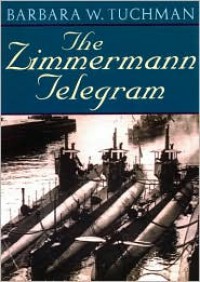4
Followers
9
Following
Clif's Book World
Adventures from reading books captured within short reviews.
The Zimmermann Telegram
 This is the history of the political and diplomatic events that caused the United States to enter World War I. Most of us have a vague recollection from our school text books that the sinking of the Lusitania had something to do with the war. But the Lusitania was torpedoed on May 7, 1915 two years prior to America entering the war in 1917. Furthermore, the Lusitania was a British ship, not American. "Remember the Lusitania" came into existence as a rallying cry after the USA had declared war.
This is the history of the political and diplomatic events that caused the United States to enter World War I. Most of us have a vague recollection from our school text books that the sinking of the Lusitania had something to do with the war. But the Lusitania was torpedoed on May 7, 1915 two years prior to America entering the war in 1917. Furthermore, the Lusitania was a British ship, not American. "Remember the Lusitania" came into existence as a rallying cry after the USA had declared war.The direction of history is always more unpredictable at the time of the events than they are for the reader of history who has knowledge of subsequent events. All readers of history today know how the story ends so it's easy to presume that there was strong support for entry into the war. Therefore it is difficult to comprehend the strength of the antiwar sentiments within the United States prior to 1917. It is true that there were a number of east coast politicians who favored entering the war. But President Wilson had won reelection in 1916 under the motto "He Kept Us Out Of War!" He won largely because of strong antiwar feelings in the midwestern and western states. As a matter of fact, my grandparents voted for the first time in their lives that year because they felt so strongly that the country should stay out of war.
Suddenly in 1917 the New York Times published the Zimmermann telegram and the mood of the country shifted. Many of the newspapers that had been staunchly antiwar up to that point then changed their positions. This book makes the case that the closest thing to a "Pearl Harbor Event" for WWI was a deciphered secret message from German Foreign Minister Arthur Zimmermann to the German Minister to Mexico, von Eckhardt, offering United States territory to Mexico in return for joining the German cause. This was a sensitive issue at the time because Mexican-American relations were quite strained. Until January 1917 the United States had nearly 5,000 troops inside Mexico and 110,000 National Guard mobilized for border service because of border violence. The Germans knew this and figured that a war with Mexico would keep the United States out of the European war.
This book tells the story of how the German communication codes were deciphered and how news about the Zimmermann telegram was released in such a way that the Germans wouldn't know that their codes had been broken. Barbara Tuchman suggests that the Germans were so sure of their intellectual superiority that they never seriously considered the possibility that their codes had been broken by others. They instead concluded that a copy of the message had been stolen after it was decoded by German embassy personnel. Tuchman also suggests that if the Germans had simply denied that they had sent the message (i.e. claim that it was a British fake) it is possible that the message wouldn't have been taken seriously. But Arthur Zimmermann decided to acknowledged that he had sent the message. (Speculation as to why he did this could make this review even longer.)
Barbara Tuchman maintains that the telegram by itself was not the cause of America entering the war, but rather it was the straw that broke the camel's back. It's true that the unrestricted submarine warfare may have eventually caused the American entry. Which raises the question, how would history have been different if the Zimmermann telegram had never existed? Tuchmann argues that without the telegram the American entry into the war would almost certainly have been delayed, and such a delay may have changed the war situation on the ground in Europe.


